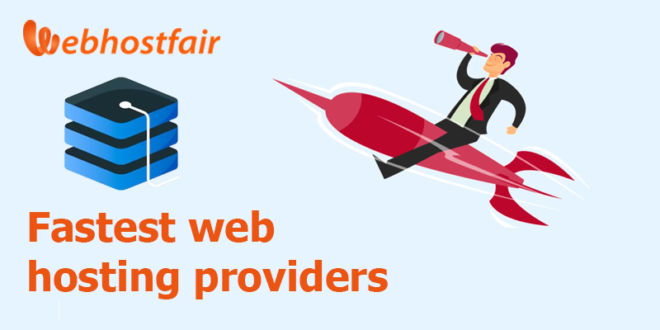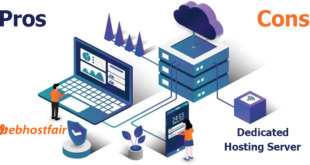In today’s digital world, website speed is crucial. Faster websites lead to better user experiences, higher engagement, improved SEO rankings, and increased conversion rates. To achieve optimal speed, choosing the right web hosting service is paramount. This guide will delve into the key factors that contribute to web hosting speed, features to look for, and recommendations for the fastest web hosting providers available.
Why Website Speed Matters
Website speed affects several critical aspects of online success:
1. User Experience
Users expect websites to load quickly. Studies show that a one-second delay in page load time can lead to a significant drop in user satisfaction and engagement. Fast-loading websites keep users happy and reduce bounce rates.
2. SEO Rankings
Search engines, particularly Google, use page speed as a ranking factor. Faster websites are more likely to rank higher in search results, leading to increased visibility and traffic.
3. Conversion Rates
E-commerce sites and businesses rely on fast load times to maximize conversions. A slow website can frustrate potential customers, leading to abandoned shopping carts and lost sales.
4. Mobile Performance
With the increasing use of mobile devices, having a fast-loading website is essential. Mobile users are often on slower connections, making speed even more critical.
Factors That Affect Web Hosting Speed
Several factors influence the speed of a web hosting service:
1. Server Location
The physical location of servers affects latency. Choosing a hosting provider with data centers close to your target audience can significantly reduce load times.
2. SSD Storage
Solid State Drives (SSDs) are much faster than traditional Hard Disk Drives (HDDs). SSDs provide quicker data access and faster load times, making them essential for fast web hosting.
3. Content Delivery Network (CDN)
A CDN distributes your website’s content across multiple servers worldwide. This ensures that users can access your site from a server close to their location, reducing load times and improving performance.
4. Caching
Effective caching mechanisms store copies of your website’s pages, allowing them to be served quickly to users. Look for hosting providers that offer robust caching solutions.
5. HTTP/2 and GZIP Compression
HTTP/2 is a newer protocol that allows multiple requests to be sent over a single connection, reducing load times. GZIP compression reduces the size of your website’s files, allowing them to be delivered faster.
6. Server Resources
Adequate CPU, RAM, and bandwidth are essential for handling traffic and ensuring fast load times. Ensure your hosting plan provides sufficient resources for your needs.
7. Optimized Software
Hosting providers that use optimized software stacks (e.g., LAMP, LEMP) can deliver better performance. Managed hosting services often include performance optimization as part of their offering.
Features to Look for in the Fastest Web Hosting
1. High Uptime Guarantee
Choose a hosting provider that guarantees at least 99.9% uptime. High uptime ensures your website is accessible and performing well at all times.
2. Global Data Centers
Providers with a global network of data centers can offer lower latency and faster load times for users worldwide.
3. Advanced Caching Solutions
Look for hosting services that include advanced caching mechanisms, such as Varnish, Memcached, or Redis.
4. Integrated CDN
An integrated CDN ensures that your website’s content is delivered quickly to users around the globe.
5. Scalable Resources
Scalability is crucial for handling traffic spikes without compromising speed. Choose a hosting plan that allows you to easily scale resources as needed.
6. 24/7 Customer Support
Responsive customer support can help resolve performance issues quickly, ensuring your website remains fast and reliable.
Recommended Fastest Web Hosting Providers
1. Kinsta
Kinsta is a managed WordPress hosting provider known for its speed and performance.
- Features: Google Cloud Platform, global data centers, Nginx server, SSD storage, built-in CDN, automatic scaling, and advanced caching.
- Pros: Excellent speed, robust security features, and top-notch customer support.
- Cons: Higher cost compared to some other providers.
2. SiteGround
SiteGround offers shared, cloud, and dedicated hosting with a focus on performance.
- Features: SSD storage, Nginx server, SuperCacher technology, free CDN, HTTP/2, and daily backups.
- Pros: Strong performance, excellent customer support, and a wide range of hosting options.
- Cons: Higher renewal rates for shared hosting plans.
3. A2 Hosting
A2 Hosting is known for its Turbo servers, which deliver enhanced speed and performance.
- Features: Turbo servers (up to 20x faster), SSD storage, free Cloudflare CDN, HTTP/2, and optimized software stack.
- Pros: Affordable pricing, excellent speed, and a variety of hosting options.
- Cons: Some plans may require additional configurations for optimal performance.
4. WP Engine
WP Engine specializes in managed WordPress hosting with a focus on speed and reliability.
- Features: Google Cloud Platform, AWS, global data centers, EverCache technology, built-in CDN, and automated SSL.
- Pros: Outstanding performance, robust security, and expert WordPress support.
- Cons: Higher pricing, suitable primarily for WordPress sites.
5. Cloudways
Cloudways offers managed cloud hosting with a focus on speed and flexibility.
- Features: Choice of cloud providers (AWS, Google Cloud, DigitalOcean, Linode, Vultr), SSD storage, built-in CDN, advanced caching, and scalable resources.
- Pros: High performance, flexible pricing, and excellent scalability.
- Cons: Requires some technical knowledge for optimal configuration.
How to Choose the Fastest Web Hosting
1. Identify Your Needs
Assess your website’s requirements, including traffic volume, target audience location, and specific performance needs. This will help you choose a hosting provider that can meet your demands.
2. Compare Features
Evaluate the features offered by different hosting providers. Look for key performance-enhancing features such as SSD storage, global data centers, advanced caching, and integrated CDN.
3. Check Reviews and Performance Tests
Look for independent reviews and performance tests to gauge the speed and reliability of potential hosting providers. Websites like GTmetrix and Pingdom offer tools to test website speed.
4. Consider Customer Support
Choose a hosting provider with responsive and knowledgeable customer support. This ensures that any performance issues can be resolved quickly.
5. Evaluate Pricing
While speed is crucial, consider the overall value offered by the hosting provider. Compare pricing plans and features to find a solution that fits your budget and performance requirements.
Choosing the fastest web hosting is essential for maximizing your website’s performance, user experience, and SEO rankings. By understanding the key factors that affect hosting speed and evaluating the top providers, you can make an informed decision that aligns with your needs. Whether you’re running a personal blog, an e-commerce site, or a high-traffic application, investing in fast web hosting will pay off in improved user satisfaction and business success.
 webhostfair Web hosting news, reviews | Best web hosting service for your business
webhostfair Web hosting news, reviews | Best web hosting service for your business

